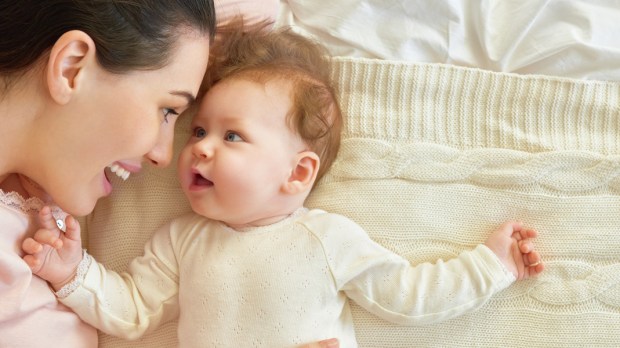Lenten Campaign 2025
This content is free of charge, as are all our articles.
Support us with a donation that is tax-deductible and enable us to continue to reach millions of readers.
Babies might not know words, but that doesn’t mean they don’t have a lot to communicate. I can always tell the difference between my daughter’s “I’m exhausted” cry, and the one that means, “I’m starving!” I know the difference between a cry of pain, and a baby that’s just cranky. Somehow, though, I rarely stop and think of what my infant is trying to tell me when she’s happy.
It turns out, though, that how we respond to our baby’s positive interactions has a lot of bearing on how quickly they learn to talk.
Researchers already knew how much making eye contact and smiling at a baby helps their development, but now they’re starting to understand how language specifically depends on having being engaged with them by having actual conversations with them.
According to an article in the Atlantic, “a new study published in the journal Infancy [found] that verbally engaging with babies — listening to their gurgles and coos and then responding, conversation-style — may speed up their language development more than simply talking at them or around them.”
This makes so much sense to me. After all, I really understand my three-month-old’s verbal cues. Sometimes her happy gurgle means “I love you, you make me feel safe,” and sometimes it means, “It’s good to see you! You’re so much fun!” There’s as much to understand when she’s happy as there is when she’s not.
So while there’s nothing wrong with making those silly baby sounds that all us mothers tend to make (“Kootchy kootchy cooo!”) it’s actually a lot better to respond to what you think they’re saying, with as much attention as we give to the less pleasant emotions.
Sara Agnew, reporting on the study, writes:
Infants whose mothers responded to what they thought their babies were saying showed an increase in developmentally advanced, consonant-vowel vocalizations, which means the babbling has become sophisticated enough to sound more like words. The babies also began directing more of their babbling over time toward their mothers. On the other hand, infants whose mothers did not try as much to understand them and instead directed their infants’ attention at times to something else did not show the same rate of growth in their language and communication skills.By the time the babies in the study were 15 months old, “The mothers who were most attentive to their infants’ babbling reported their children produced more words and gestures.”
Julie Gros-Louis, author of the study, explains that responding to babies so specifically shows them that they really do have the capacity to communicate with you. It shows them that it’s worth the effort. It shows them that they’re getting through to us, despite the massive language barrier.
When a baby makes noises, it’s not just for fun. They really have something they need you to understand, and your attentive response is a big deal. It doesn’t surprise me that babies who are really listened to learn language so much faster — they’ve been encouraged, all along, to keep trying.
Read more:
“Baby Talk” Happens Before Birth

